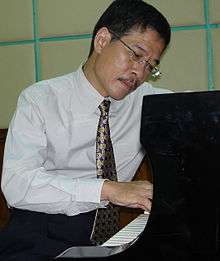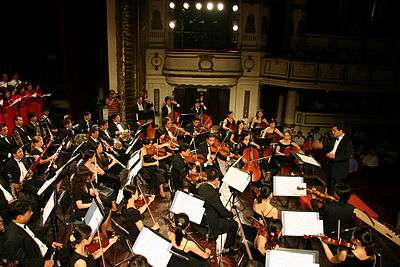Đặng Hữu Phúc
| Đặng Hữu Phúc | |
|---|---|
 | |
| Background information | |
| Origin | Vietnam |
| Genres | classical |
| Occupation(s) | musician, composer |
| Instruments | Piano |
Đặng Hữu Phúc (born 1953) is a Vietnamese pianist and composer best known for his film scores. A graduate of the Hanoi Conservatory, he has penned over 60 works, primarily for film and theatre.[1]
In 2001 he won the Vietnam National Film Award Best Music for The Season of Guavas.[2] Then he subsequently won the Best Music prize in 2005 at the 8th Shanghai International Film Festival for his work on Hồ Quang Minh's film Thời xa vắng ("A Far Time Past")[3] based on the novel of the same name by Lê Lựu.[4]
Đặng is best known as a composer of symphonies and orchestral music, combining this traditional European style of music with elements of traditional Vietnamese music, such as Nhạc dân tộc cải biên. He is also noted in Vietnam for his instrumental music such as piano sonatas.[5]
Works

Vocal works
Đặng Hữu Phúc has written several works for choir and orchestra. His choral symphony to poems of Nguyễn Đình Thi (1973) was performed at the Hanoi Opera House when the composer was only 20 years old. In 2004 10 pieces for a cappella choir ("10 bài cho hợp xướng không nhạc đệm") premiered, again at the Hanoi Opera House.
Phúc is also known for classical songs. In 1974 he wrote Ba bức tranh ("Three Paintings") for soprano and 2 pianos, which was premiered at the Vietnam School of Music by soprano Ái Vân. In 2006 he published the fruit of 30 years work, 60 selected romances for voice and piano (“Tuyển chọn 60 bài Romances và Ca khúc cho giọng hát với Piano”) - the first major Lieder collection by a Vietnamese composer. Several of these songs have been widely performed and broadcast including "Cơn mưa sang đò" ("Rain upon the boat"), "Trăng chiều" ("Moonlit"), “Ru con mùa đông” ("Lullaby of winter"), “Tôi vẫn hát” ("I still sing"). 14 of the songs were submitted for and won the Vietnam composers' award.
Film music
- A woman pickpocket (Bỉ vỏ)
- A far time past (Thời xa vắng)
- The season of guavas (Mùa ổi)
- Người đàn bà nghịch cát
- Tướng về hưu
Discography
- Đặng Hữu Phúc Phác Thảo Mùa Thu (Vol 1.) CD[6]
References
- ↑ Nhạc sĩ Đặng Hữu Phúc và những bản Romance chưa từng công bố 30/03/2010
- ↑ Nguyễn Thị Hồng Ngát Lịch sử điện ảnh Việt Nam (The History of Vietnamese Film) Cục điện ảnh (Bureau of Film, Vietnam) 2005 Volume 2 - Page 683 "Âm nhạc xuất sắc nhất cho Đặng Hữu Phúc (phim Mùa ổi)" Translation: "Best Music Award to Đặng Hữu Phúc (film Season of Guavas)"
- ↑ Kỷ yếu Hội nghị triển khai công tác văn hóa-thông tin năm 2006 và tổng kết 5 năm thực hiện chương trình mục tiêu quốc gia về văn hóa giai đoạn 2001-2005 (Proceedings of the Conference on implementation of culture-information in 2006, and conclusions of 5 Year Plan 2001-2005) Bộ văn hóa và thông tin (Ministry of Culture and Information of Vietnam) 2006 Page 361 "Nhạc sĩ Đặng Hữu Phúc, người viết nhạc phim Thời xa vắng, doạt giải Ấm nhạc xuất sắc nhất tại Liên hoan phim Quốc tế Thượng Hải lẩn thú 8, năm 2005." Translation: The composer Đặng Hữu Phúc wrote The soundtrack for the film "A Far Time Past" which won the best music at the 8th Shanghai International Film Festival in 2005."
- ↑ David Wee Hock Koh, Wards of Hanoi Institute of Southeast Asian Studies - 2006 "For other sources of this deeply-ingrained Vietnamese cultural trait, see the novel by Lê Lựu, Thời xa vắng, 4th ed.
- ↑ Tú Ngọc Âm nhạc mới Việt Nam tiến trình và thành tựu (New Music of Vietnam Progress and Achievements) 2000 Page 806 "Xônát phức điệu của Đặng Hữu Phúc được hoàn thành năm 1978 - 1979 cho pianô độc tấu. Tác phấm gốm ba phẩn: Phẩn mở đầu - Xônát - Phẩn kết. Phân mớ đâu: âm nhạc vang lên chậm răi - Adagio Sostenuto e Rubato. " Translation: "The sonata on complex rhythms of Đặng Hữu Phúc was completed 1978-1979 for solo piano. The work consists of three parts: the overture - the sonata - the end. The overture begins with the music played slowly - Adagio sostenuto e rubato."
- ↑ CD cover Đặng Hữu Phúc Phác Thảo Mùa Thu Vol 1. (jpg)
External links
- Huu Phuc Dang at the Internet Movie Database
- "Cultural events to celebrate national day", Vietnam+, 27/08/2009
- "Orchestra hits half-century mark", VietNamNet Bridge, 20/05/2009